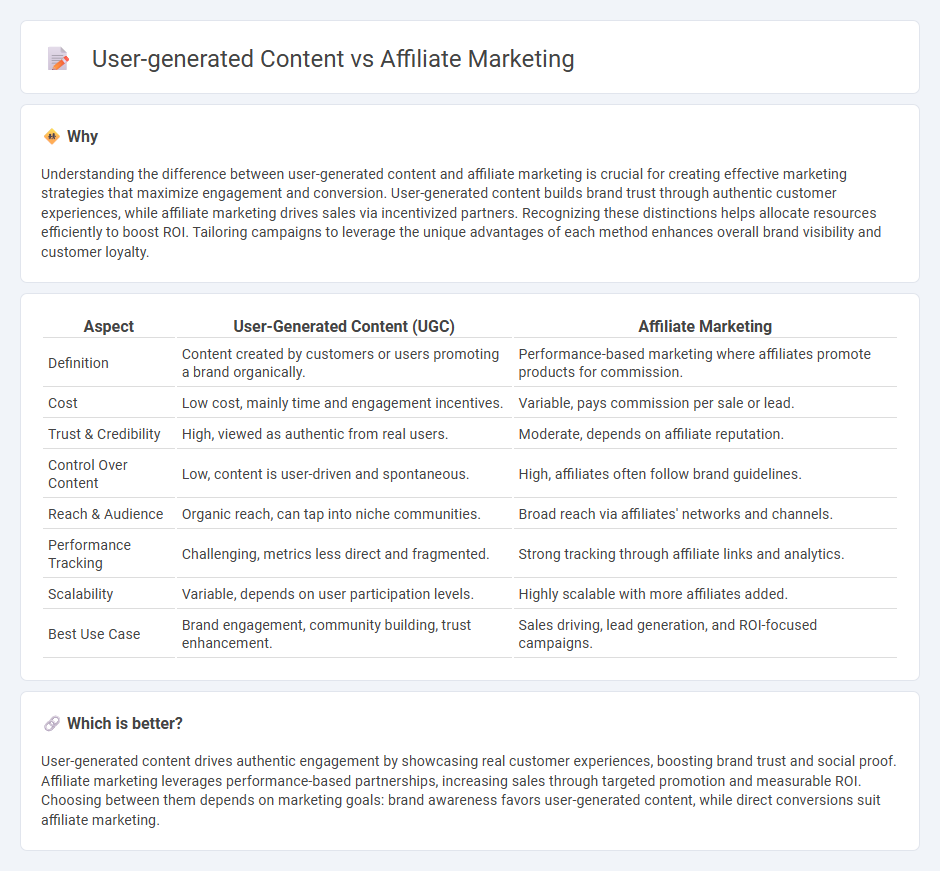
User-generated content harnesses authentic customer experiences and social proof to boost brand credibility and engagement. Affiliate marketing leverages third-party partnerships to expand reach and drive sales through commission-based promotions. Discover how these strategies can uniquely elevate your marketing efforts.
Why it is important
Understanding the difference between user-generated content and affiliate marketing is crucial for creating effective marketing strategies that maximize engagement and conversion. User-generated content builds brand trust through authentic customer experiences, while affiliate marketing drives sales via incentivized partners. Recognizing these distinctions helps allocate resources efficiently to boost ROI. Tailoring campaigns to leverage the unique advantages of each method enhances overall brand visibility and customer loyalty.
Comparison Table
| Aspect | User-Generated Content (UGC) | Affiliate Marketing |
|---|---|---|
| Definition | Content created by customers or users promoting a brand organically. | Performance-based marketing where affiliates promote products for commission. |
| Cost | Low cost, mainly time and engagement incentives. | Variable, pays commission per sale or lead. |
| Trust & Credibility | High, viewed as authentic from real users. | Moderate, depends on affiliate reputation. |
| Control Over Content | Low, content is user-driven and spontaneous. | High, affiliates often follow brand guidelines. |
| Reach & Audience | Organic reach, can tap into niche communities. | Broad reach via affiliates' networks and channels. |
| Performance Tracking | Challenging, metrics less direct and fragmented. | Strong tracking through affiliate links and analytics. |
| Scalability | Variable, depends on user participation levels. | Highly scalable with more affiliates added. |
| Best Use Case | Brand engagement, community building, trust enhancement. | Sales driving, lead generation, and ROI-focused campaigns. |
Which is better?
User-generated content drives authentic engagement by showcasing real customer experiences, boosting brand trust and social proof. Affiliate marketing leverages performance-based partnerships, increasing sales through targeted promotion and measurable ROI. Choosing between them depends on marketing goals: brand awareness favors user-generated content, while direct conversions suit affiliate marketing.
Connection
User-generated content (UGC) amplifies affiliate marketing by providing authentic testimonials and organic brand exposure, enhancing trust and conversion rates. Affiliate marketers leverage UGC such as reviews, social media posts, and videos to attract targeted audiences and boost sales performance. Integrating UGC into affiliate campaigns enriches content diversity and drives higher engagement through genuine consumer experiences.
Key Terms
Commission
Affiliate marketing leverages commission-based incentives to motivate partners in promoting products or services, driving sales through trackable referral links. User-generated content, while boosting brand authenticity and engagement, does not directly offer commission but enhances organic reach and customer trust. Explore how strategic use of commissions can optimize affiliate marketing success.
Influencers
Influencers play a pivotal role in both affiliate marketing and user-generated content (UGC) strategies, driving authentic engagement and trust among audiences. In affiliate marketing, influencers promote products through unique links, earning commissions for each sale, whereas in UGC, they create organic content that fosters community connection without direct monetary incentives. Discover how leveraging influencers in these approaches can elevate your brand's reach and conversion rates.
Authenticity
Affiliate marketing leverages partnerships where influencers or affiliates promote products for commissions, often prioritizing performance over genuine user experience. User-generated content (UGC) emphasizes authenticity by showcasing real customers sharing honest reviews and personal stories, enhancing trust and brand credibility. Explore how blending these strategies can maximize authenticity and engagement for your marketing goals.
Source and External Links
What Is Affiliate Marketing and How to Get Started - Coursera - Affiliate marketing is a model where third-party publishers promote a merchant's products or services and earn a commission on resulting sales or traffic, benefiting both businesses and affiliates through revenue sharing and requiring audience building and staying updated on industry trends.
Affiliate Marketing 101: What it is and How to Get Started - BigCommerce - Affiliate marketing involves three parties: sellers who create products, affiliates who promote the products to their niche audiences, and consumers who buy the products, with affiliates earning commissions from sales they influence.
Affiliate Marketing Guide: All You Need To Know (2025) - Shopify - Affiliate marketing is a performance-based strategy where affiliates earn commissions by promoting products via unique tracking links, with beginners recommended to choose a niche, select platforms, join affiliate programs, create valuable content, and grow an audience to maximize earnings.
 dowidth.com
dowidth.com